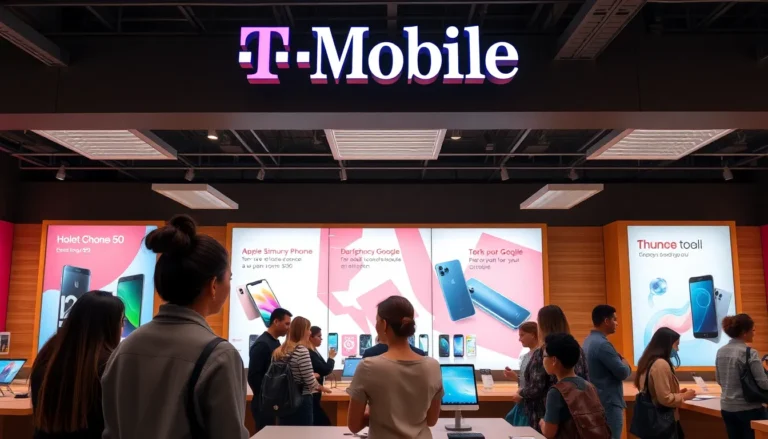In a world where smartphones are practically an extension of our hands, mobile technology has transformed the way we live, work, and play. From the sleek designs of the latest devices to the powerful networks that keep us connected, there’s a whole universe of mobile innovations waiting to be explored. It’s like a buffet of tech goodness, and trust us, you don’t want to miss out on the feast!
Table of Contents
ToggleOverview Of Mobile Technology
Mobile technology encompasses a range of devices and networks that facilitate communication, information access, and entertainment. Smartphones represent the forefront of this technology, integrating computing capabilities with telecommunication functions. Mobile apps further enhance user experiences, allowing for tasks such as banking, shopping, and social networking.
Cellular networks, including 4G and the emerging 5G, provide the infrastructure for communication. 5G technology offers faster data transfer speeds and lower latency, supporting innovations like smart cities and the Internet of Things (IoT). Millions of devices now connect seamlessly, sharing information instantaneously.
Tablets and wearables also contribute to this landscape. Tablets combine portability with larger screens, making content consumption more enjoyable. Wearable devices like smartwatches monitor health and fitness, providing real-time data on vital signs and activity levels.
Mobile payment systems have transformed how users conduct financial transactions. Digital wallets enable quick checkouts, enhancing convenience for consumers. In various sectors, businesses are adopting mobile-first strategies to engage customers effectively, recognizing the importance of mobile technology for growth.
Security features have become crucial as mobile technology evolves. Biometric authentication methods like fingerprint and facial recognition improve user security while ensuring privacy. Regular software updates and encryption protocols help protect sensitive information.
The influence of mobile technology permeates daily life, facilitating connectivity across different platforms. Innovations in augmented reality and virtual reality are expanding the boundaries of mobile applications, creating immersive experiences. Mobile technology continually evolves, shaping the way people interact with the world around them.
Types Of Mobile Technology

Mobile technology comprises various devices that enhance communication and convenience. Below are the primary categories.
Smartphones
Smartphones represent the pinnacle of mobile technology. They integrate advanced computing capabilities with communication features. Popular operating systems like iOS and Android power these devices, offering diverse applications. High-resolution cameras enable photography and video recording, appealing to creative users. Manufacturers frequently release new models, incorporating faster processors and improved battery life. Many smartphones support 5G connectivity, allowing users to access data at unprecedented speeds.
Tablets
Tablets serve as a bridge between smartphones and laptops. Their larger screens provide an optimal experience for browsing, gaming and streaming videos. Operating systems such as iOS and Android make them user-friendly. Many tablets emphasize portability and come with accessories like keyboards for enhanced productivity. Graphics performance often rivals that of traditional laptops, catering to gamers and graphic designers alike. Users frequently utilize tablets for reading eBooks and taking notes in educational settings.
Wearables
Wearables encompass devices that enhance everyday activities through technology. Smartwatches stand out, offering fitness tracking and health monitoring features. Users can receive notifications, answer calls, and track workouts without reaching for their smartphones. Fitness bands specifically target health-conscious individuals, focusing on monitoring heart rates and sleep patterns. This technology continues to evolve, with features like stress management and ECG readings becoming increasingly common. Many wearables seamlessly integrate with smartphones, creating a connected ecosystem.
IoT Devices
IoT devices exemplify the interconnected nature of modern technology. They enable communication between various appliances and systems, streamlining everyday tasks. Smart home devices, including thermostats, lights and security cameras, enhance convenience and security. Some users can control these elements remotely via mobile apps. Additionally, IoT innovations extend to industries, improving efficiency and data management in factories and agricultural settings. Smart cities utilize these devices to optimize resources and enhance urban living experiences.
Mobile Technology Innovations
Mobile technology innovations continue to reshape user experiences and enhance daily life. Technologies like 5G, augmented reality, and mobile payment systems represent the forefront of these advancements.
5G Technology
5G technology promises significantly faster data speeds, surpassing 4G’s capabilities. With download speeds reaching up to 10 Gbps, it enables real-time data sharing for applications like telemedicine and remote education. Enhanced connectivity supports the growth of smart cities by connecting devices, traffic systems, and emergency services seamlessly. Manufacturers now integrate 5G into smartphones, tablets, and IoT devices, streamlining functionality across platforms. This technology reduces latency, making online gaming and video conferencing more responsive and enjoyable for users.
Augmented Reality
Augmented reality (AR) transforms how users interact with their environment. By overlaying digital elements onto the real world, it enhances gaming, education, and retail experiences. Applications like Pokémon GO have illustrated AR’s potential, engaging millions in innovative ways. Retailers now employ AR for virtual try-ons, allowing customers to visualize products before purchase. Educational platforms leverage AR to create immersive learning experiences that captivate users and promote better understanding. Broad adoption of AR technology demonstrates its relevance and potential to revolutionize various industries.
Mobile Payment Systems
Mobile payment systems have significantly streamlined financial transactions. Users can effortlessly make purchases through digital wallets, such as Apple Pay and Google Pay, enhancing convenience and security. Adoption of contactless payments has surged, particularly during the COVID-19 pandemic, as people sought to minimize physical contact. Retailers benefit from faster checkout processes, improving customer satisfaction. As security features like biometric authentication become standard, trust in mobile payment systems continues to grow, driving wider usage across diverse demographics. This shift marks a new era in how users conduct transactions.
Impact Of Mobile Technology
Mobile technology significantly influences daily life, enhancing communication and access to information.
Social Connectivity
Social connectivity thrives due to mobile technology. Users now communicate instantly via messaging apps and social media platforms. Friendships and relationships strengthen as people stay in touch no matter the distance. Networking opportunities expand, allowing individuals to connect professionally across various industries. The rise of video calling enriches interactions, helping users forge deeper connections. Mobile technology enables sharing experiences through photos and live videos, creating shared moments even when physically apart.
Business Transformation
Business transformation occurs through the integration of mobile technology. Companies leverage mobile applications to streamline operations and improve customer engagement. With data-driven insights, businesses can tailor services to meet specific consumer needs. Mobile payment solutions enhance transaction speed and convenience, boosting sales and customer loyalty. Employees access resources on-the-go, increasing productivity and flexibility. Remote work options become feasible, fostering a better work-life balance. The impact of mobile technology on business continues to evolve as companies adopt mobile-first strategies, ensuring sustainable growth in a competitive market.
Mobile technology has undeniably transformed how individuals and businesses operate in today’s fast-paced world. Its diverse range of devices and applications continues to enhance daily life by providing convenience and connectivity. As innovations like 5G, augmented reality, and advanced mobile payment systems emerge, the potential for further advancements seems limitless.
The integration of mobile tech into various sectors not only streamlines operations but also fosters deeper connections among users. The ongoing evolution of this technology ensures that it remains a vital component of modern living, shaping experiences and driving growth in countless ways. Embracing these advancements will pave the way for a more connected and efficient future.


